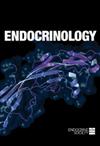Circadian regulatory networks of glucose homeostasis and its disruption as a potential cause of under-nutrition.
IF 3.8
3区 医学
Q2 ENDOCRINOLOGY & METABOLISM
引用次数: 0
Abstract
The circadian clock system, an evolutionarily conserved mechanism, orchestrates diurnal rhythms in biological activities such as behavior and metabolism, aligning them with the earth's 24-hour light/dark cycle. This synchronization enables organisms to anticipate and adapt to predictable environmental changes, including nutrient availability. However, modern lifestyles characterized by irregular eating and sleeping habits disrupt this synchrony, leading to metabolic disorders such as obesity and metabolic syndrome, evidenced by higher obesity rates among shift workers. Conversely, circadian disturbances are also associated with reduced nutrient absorption and an increased risk of malnutrition in populations such as the critically ill or the elderly. The precise mechanisms of these disturbances in leading to either over-nutrition or under-nutrition is complex and not yet fully understood. Glucose, a crucial energy source, is closely linked to obesity when consumed excessively and to weight loss when intake is reduced, which suggests that circadian regulation of glucose metabolism is a key factor connecting circadian disturbances with nutritional outcomes. In this review, we describe how the biological clock in various tissues regulates glucose metabolism, with a primary focus on studies utilizing animal models. Additionally, we highlight current clinical evidence supporting the association between circadian disturbance and glucose metabolism, arguing that such disruption could predominantly contribute to under-nutrition due to impaired efficient utilization of nutrients.葡萄糖平衡的昼夜节律调控网络及其作为营养不良潜在原因的破坏。
昼夜节律钟系统是一种进化保守的机制,它协调行为和新陈代谢等生物活动的昼夜节律,使其与地球的 24 小时光/暗周期保持一致。这种同步性使生物能够预测和适应可预测的环境变化,包括营养供应。然而,以不规律的饮食和睡眠习惯为特征的现代生活方式破坏了这种同步性,导致肥胖和代谢综合征等代谢紊乱,轮班工人的肥胖率较高就是证明。相反,昼夜节律紊乱也与营养吸收减少和危重病人或老年人等人群营养不良的风险增加有关。这些紊乱导致营养过剩或营养不良的确切机制十分复杂,目前尚未完全明了。葡萄糖是一种重要的能量来源,摄入过多与肥胖密切相关,而摄入减少则会导致体重减轻,这表明葡萄糖代谢的昼夜节律调节是将昼夜节律紊乱与营养结果联系起来的一个关键因素。在这篇综述中,我们描述了各种组织中的生物钟如何调节葡萄糖代谢,主要侧重于利用动物模型进行的研究。此外,我们还强调了目前支持昼夜节律紊乱与葡萄糖代谢之间联系的临床证据,认为这种紊乱可能主要导致营养不足,因为营养物质的有效利用受到了影响。
本文章由计算机程序翻译,如有差异,请以英文原文为准。
求助全文
约1分钟内获得全文
求助全文
来源期刊

Endocrinology
医学-内分泌学与代谢
CiteScore
8.10
自引率
4.20%
发文量
195
审稿时长
2-3 weeks
期刊介绍:
The mission of Endocrinology is to be the authoritative source of emerging hormone science and to disseminate that new knowledge to scientists, clinicians, and the public in a way that will enable "hormone science to health." Endocrinology welcomes the submission of original research investigating endocrine systems and diseases at all levels of biological organization, incorporating molecular mechanistic studies, such as hormone-receptor interactions, in all areas of endocrinology, as well as cross-disciplinary and integrative studies. The editors of Endocrinology encourage the submission of research in emerging areas not traditionally recognized as endocrinology or metabolism in addition to the following traditionally recognized fields: Adrenal; Bone Health and Osteoporosis; Cardiovascular Endocrinology; Diabetes; Endocrine-Disrupting Chemicals; Endocrine Neoplasia and Cancer; Growth; Neuroendocrinology; Nuclear Receptors and Their Ligands; Obesity; Reproductive Endocrinology; Signaling Pathways; and Thyroid.
 求助内容:
求助内容: 应助结果提醒方式:
应助结果提醒方式:


